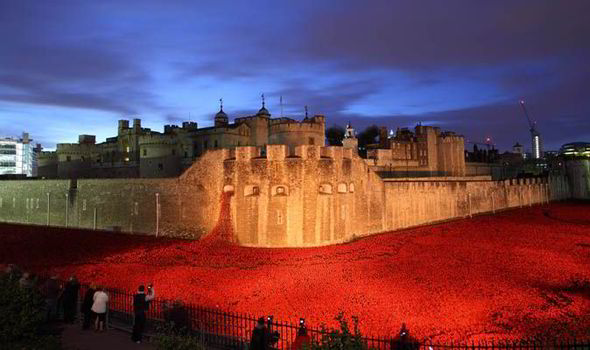After a controversial ban that forbids family members from placing the Tower of London poppies on the graves of the relatives who died during World War One, the Commonwealth War Graves Commission has made a u-turn.
Even though family members of some of the fallen soldiers expressly bought the poppies worth £25 to place on the graves of their loved ones in the official graveyards close to where the fighting happened, last month – the Commonwealth War Graves Commission cautioned it would remove them. The announcement was confirmed by the commission on October 20.
But the commission has made a U-turn in relation to the warnings to remove them and have now announced the poppies would be allowed a permanent place on the fallen soldiers’ graves. The only condition they say would make them now remove the poppies is if they were broken.
About 888,246 poppies surrounding the Tower of London were supposed to be ripped into pieces within a few days before this new decision announced that they’ll now be allowed.
Every single poppy placed there represent each British military service man that was killed during World War One. They have become enormously popular memorial observed by over four million persons as well as the Queen and Duke of Edinburgh.
Money raised from it is distributed among charitable organisations responsible for helping former British servicemen and women.
The change of heart by the commission was welcomed by Allan Burgess, the North Regional Secretary of the Parachute Regimental Association that is in charge of Northern Ireland and Scotland. He thinks the former decision to throw away the Tower of London poppies was ridiculous as he has also bought one to place at the private grave of his father in law.
Another person that was very satisfied with the new decision is 28-year-old Mike Elkins from Salisbury in Wiltshire. His great-uncle was a service man during World War One and was killed by a German sniper, the Express reports.
Mike made a tweet in which he alleged the commission told him leaving ceramic tributes on the graves of the fallen heroes in Belgium was not allowed.
In 1914, Mike’s great-uncle, Private Walter Newman signed up to fight in World War One under the Wiltshire Regiment. He was only 33 when a sniper shot and killed him in Kemmel on February 5th.
Expressing his excitement, Mike said he hopes other people will be encouraged to place the Tower of London poppies by the war graves of their loved ones. He said the poppies are symbolic and help keep the display alive.
He commended the commission for their change of mind and said they captured the public’s imagination and it would have been a shame for people to shut away the poppies in their homes instead of the graves of the fallen heroes of World War One.
